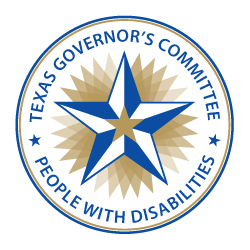Governor’s Committee on People with Disabilities
In existence since September of 1950, the Texas Governor’s Committee on People with Disabilities (GC PD) works toward a state in which people with disabilities have the opportunity to enjoy full and equal access to lives of independence, productivity and self-determination. The Governor appoints twelve members to serve on the Committee, seven of whom must be people with disabilities. Representatives from eight state agencies serve as ex-officio or advisory members.
PD) works toward a state in which people with disabilities have the opportunity to enjoy full and equal access to lives of independence, productivity and self-determination. The Governor appoints twelve members to serve on the Committee, seven of whom must be people with disabilities. Representatives from eight state agencies serve as ex-officio or advisory members.
The committee’s enabling law is outlined in the Human Resources Code, Chapter 115.
Mission Statement
The committee's mission is to further opportunities for persons with disabilities to enjoy full and equal access to lives of independence, productivity, and self-determination.
Key Services
The Governor's Committee makes recommendations to the Governor and Legislature on disability issues in the areas of accessibility, communication, criminal justice, education, emergency preparedness, employment, health, housing, transportation, and veterans. The committee supports a network of local committees performing similar work for people with disabilities, issues awards to promote greater awareness, and promotes compliance with disability related laws. Committee members and staff will also provide technical assistance and information/referral services to citizens of Texas on issues affecting Texans with disabilities.
